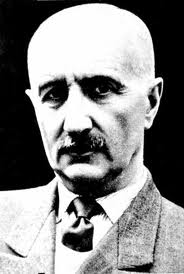
Born: April 3, 1886, Warsaw. Russian partition of Poland (presently Poland)
Died: April 4, 1980, Warsaw, Poland
Early days. His father, Franciszek Ksawery Tatarkiewicz , was a lawyer, attorney and PUBLICYSTA. His mother was Maria Tatarkiewicz (nee Lubicz-Brzezinska). He went to the philological gimnazjum (high school) in Warsaw. Then he began his higher education at Warsaw University studying law, psychology, philosophy, anthropology, zoology, and art history. When it was closed by the Russian Imperial authorities in 1905, he was forced to continue his education abroad in Marburg, Hesse, Germany where he studied from 1907 to 1910. He also studied in Paris and in Lwow, Poland where he habilitated in 1919.
Career. He began his career in Warsaw as a lecturer in philosophy, teaching at a girls' school on Mokotowska Street. Tatarkiewicz directed its philosophy department in 1915–19. In 1919–21 he was professor at Stefan Batory University in Wilno, Poland where he taught the history of philosophy. In 1921–23 he taught history of art and esthetics at the University of Poznań, and in 1923–61 again at the University of Warsaw. In 1924 he beacme the editor of “Przeglad Filozoficzny.” In 1930 he became a member of the Polish Academy of Sciences. During World War II, risking his life, he conducted underground lectures in German-occupied Warsaw (one of the auditors was Czesław Miłosz). After the suppression of the Warsaw Uprising (August–October 1944) he again consciously risked his life when retrieving a manuscript from the gutter, where a German soldier had hurled it (this and other materials were later published as a book, in English translation titled Analysis of Happiness). From 1960 till 1963 he edited “Estetyka.” In 1974 he taught “Aesthetics’ in Lausanne, Switzerland. In his Memoirs, published shortly before his death, he recalled having been ousted from his University chair by a (politically-connected) former student. Characteristically, he saw even that indignity as a blessing in disguise, as it gave him freedom from academic duties and the leisure to pursue research and writing. Tatarkiewicz reflected philosophically that at all crucial junctures of his life he had failed to foresee events, many of them tragic, but that this had probably been for the better, since he could not have altered them anyway. Tatarkiewicz belonged to the interbellum Lwów-Warsaw School of Philosophy, created by Kazimierz Twardowski, which gave reborn Poland many outstanding scholars and scientists: philosophers, logicians, psychologists, sociologists, and organizers of academia. Tatarkiewicz educated generations of Polish philosophers, estheticians and art historians, as well as a multitude of interested laymen. He posthumously continues to do so through his famous History of Philosophy and numerous other works.
Personal. He married Teresa Helena Maria Potworowska, they had a son Krzysztof.
Awards, distinctions 1933 – filister honoris causa of an academic corporation „Aquilonia.” 1938- awarded a Commandor Cross of Polonia Restituta. A stamp with his portrait was issued by the Polish Postal Service.
Monographs. History of Philosophy, three volumes (1978 Polish: Historia filozofii); 1970; 1974; History of Aesthetics, three volumes (`962; 1967 Polish: Historia estetyki); 1976 Analysis of Happiness (The Hague, Martinus Nijhoff, 1962 Polish: O Szczesciu); 1980 A History of Six [aesthetic] Ideas (1976 Polish: Dzieje szecciu pojec); 1979 On Perfection (English translation by Christopher Kasparek); 1981Memoirs (1979 Polish: Wspomnienia-with his wife Teresa- Panstwowy Instytut Wydawniczy).
Main source:
This article uses mostly material from the Wikipedia article "Wladyslaw Tatarkiewicz." Text is available under the Creative Commons Attribution-ShareAlike License :
Wikipedia
Other source
Genealogical data
Return to home page:
Prominent Poles